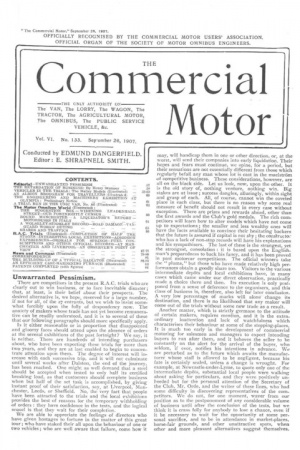Unwarranted Pessimism.
Page 1

If you've noticed an error in this article please click here to report it so we can fix it.
There are competitors in the present R.A.C. trials who are clearly out to win business, or to face inevitable disaster ; that, at least, is their belief about their prospects. The desired alternative is, we hope, reserved for a large number, if not for all, of the 27 entrants, but we wish to insist somewhat forcibly upon the folly of despondency now. The anxiety of makers whose trade has not yet become remunerative can be readily understood, and it is to several of these that our following paragraphs should more specifically apply. Is it either reasonable or in proportion that disappointed and gloomy faces should attend upon the absence of orders at the several exhibitions of the past fortnight? We say, it is neither. There are hundreds of intending purchasers about, who have been expecting these trials for more than two years, and they are at last enabled to begin to concentrate attention upon them. The degree of interest will increase with each successive trip, and it will not culminate until several weeks after Dalston, the end of the journey, has been reached. One might as well demand that a steel should be accepted when tested to only half its certified breaking load, as that customers should complete business when but half of the set task is accomplished, by giving instant proof of their satisfaction, say, at Liverpool, Manchester, Leeds, or Sheffield. No, the very fact that people have been attracted to the trials and the local exhibitions provides the best of reasons for the temporary withholding of orders : they have confidence in the tests, and the logical sequel is that they wait for their completion.
We are able to appreciate the feelings of directors who have given hostages to fortune in the matter of this great tour ; who have staked their all upon the behaviour of one or two vehicles ; who are well aware that failure, come how it
may, will handicap them in one or other direction, or, at the worst, will send their companies into early liquidation. Their hopes and fears must continue, we opine, for a period, but their sensations are not essentially different from those which regularly befall any man whose lot is cast in the maelstrom of competitive business. These considerations, however, are all on the black side. Let us look, now, upon the other. It is the old story of, nothing venture, nothing win. Big slakes are at issue ; success dangles, alluringly, within sight and grasp of each. All, of course, cannot win the coveted place in each class, but there is no reason why some real measure of benefit should not result in every case without exception. There are prizes and rewards ahead, other than the first awards and the Club's gold medals. The rich competitors will learn how to alter models which have not come up to expectations ; the smaller and less wealthy ones will have the facts available to convince their hesitating backers that the future is assured if capital is not shy ; the congtructo: who has a lack of non-stop records will have his explanations and his sympathisers. The last of these is the strangest, yet the strongest, consolation : it is based upon the Englishman's preparedness to back his fancy, and it has been proved in past motorcar competitions. The official winners take the " plums," but those who have made relatively high performances obtain a goodly share too. Visitors to the various intermediate depOts and local exhibitions have, in many cases which came under our direct observation, practically made a choice there and then. Its execution is only postponed from a sense of deference to the organisers, and this class of business is, therefore, also left for later conclusion. A very low percentage of marks will alone change its destination, and there is no likelihood that any maker will come out of the trials without some new trade as a result.
Another matter, which is strictly germane to the attitude of certain makers, requires mention, and it is the extraordinary inattention and lack of watchfulness which characterises their behaviour at some of the stopping-places. It is much too early in the development of commercial motoring for salesmen and managers to expect intending buyers to run after them, and it behoves the seller to be constantly on the alert for the arrival of the buyer, who seldom, if ever, notifies his intentions in advance. We are perturbed as to the future which awaits the manufacturer whose staff is allowed to be negligent, because his fate is certainly sealed, unless a change is wrought. For example, at Newcastle-under-Lyme, to quote only one of the intermediate depots, substantial local people were walking about asking for particulars, and they were positively unheeded but for the personal attention of the Secretary of the Club, Mr. Orde, and the writer of these lines, who had some difficulty in discovering representatives of the competitors. We do not, for one moment, waver from our position as to the postponement of any considerable volume of business until after the conclusion of the tests, but we think it is crass folly for anybody to lose a chance, even if it be necessary to wait for the opportunity at some personal sacrifice, and to be in attendance in market-places, horse-fair grounds, and other unattractive spots, when other and more pleasant alternatives suggest themselves.




























